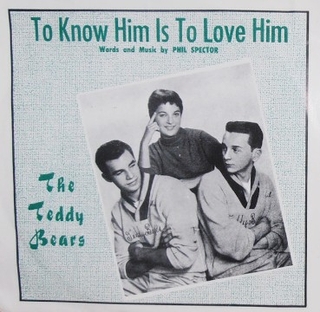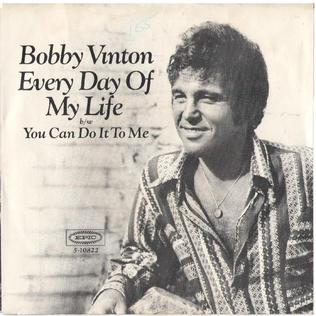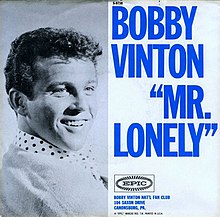
Stanley Robert Vinton is an American former singer and occasional actor, who also hosted his own self-titled TV show in the late 1970s. As a teen idol, he became known as "The Polish Prince", as his music paid tribute to his Polish heritage. One of his most popular songs is "Blue Velvet" which reached No. 1 on the Billboard Hot 100 in 1963, No. 1 in Canada, and number 2 in the UK in 1990.

"Lonely" is a song by Senegalese-American singer-songwriter Akon; it appears on his debut album, Trouble. Featuring a prominent, high-pitched sample of the 1964 song "Mr. Lonely" by Bobby Vinton, the single was released on February 22, 2005. "Lonely" reached number one in several countries, including in the United Kingdom, Australia, and Germany, where it stayed for eight weeks. It also entered the top five in France, where it reached number two, and in the United States, where it peaked at number four.

"Take Good Care of My Baby" is a song written by Carole King and Gerry Goffin. The song was made famous by Bobby Vee, when it was released in 1961.
"Blue Velvet" is a popular song written and composed in 1950 by Bernie Wayne and Lee Morris. A top 20 hit for Tony Bennett in its original 1951 version, the song has since been re-recorded many times, with a 1963 version by Bobby Vinton reaching No. 1.

Roses Are Red is Bobby Vinton's third studio album, released in 1962. After Vinton's hit "Roses Are Red " reached No. 1, the eponymous album was released and made its way up to No. 5 on the Billboard 200. Shortly after the success of the song and album, Epic renewed Vinton's contract but changed his artist title from a bandleader to a solo artist.

Bobby Vinton's Greatest Hits is a 12-track compilation by Bobby Vinton. It was released in September 1964, two months after his album Tell Me Why.

"To Know Him Is to Love Him" is a song written by Phil Spector, inspired by words on his father's tombstone, "To Know Him Was to Love Him." It was first recorded by the only vocal group of which he was a member, the Teddy Bears. Their recording spent three weeks at No. 1 on the Billboard Hot 100 chart in 1958, while reaching No. 2 on the UK's New Musical Express chart. Peter & Gordon and Bobby Vinton later had hits with the song, with its title and lyrics changed to "To Know You Is to Love You". In 1987, the song was resurrected by Dolly Parton, Linda Ronstadt, and Emmylou Harris, whose Trio recording topped the U.S. country singles chart.

The discography of American singer-songwriter Bobby Vinton consists of 38 studio albums, 67 compilation albums, two video albums, three live albums, and 88 singles.

"Roses Are Red (My Love)" is a popular song composed by Al Byron and Paul Evans. It was recorded by Bobby Vinton, backed by Robert Mersey and his Orchestra, in New York City in February 1962, and released in April 1962, and the song was his first hit.
"There! I've Said It Again" is a popular song written and published by Redd Evans and David Mann in 1941. In early 1945, Vaughn Monroe and his Orchestra released Victor 20-1637, which reached the number one position on the Billboard's National Radio Airplay chart for five straight weeks, then no.2 for six more weeks, and a total run of 29 weeks. It finished 1945 as the no. 4 record of the year.

"Only Love Can Break a Heart" is a popular song from 1962, performed by the American singer-songwriter Gene Pitney. The song was written by Hal David (words) and Burt Bacharach (music) and appears on Pitney's second album Only Love Can Break a Heart.

"Ev'ry Day of My Life" is a popular song written in 1954 by Al Jacobs and Jimmie Crane.

"Tears" is a song written by lyricist Frank Capano and composer Billy Uhr, which was popularised by Rudy Vallée in 1930. It was later made famous in a version recorded by Ken Dodd, released as a 45 rpm single in 1965, which became a bestselling No. 1 hit in the UK Singles Chart.

"Hurt" is a 1954 song by Jimmie Crane and Al Jacobs. "Hurt" was originally performed by Roy Hamilton, whose version peaked at number eight on the R&B Best Seller chart and spent a total of seven weeks on the chart. A version by Ricky Denell also received considerable radio airplay in 1954 on pop radio stations. The song is considered to be the signature hit of Timi Yuro, whose version went to number four on the Billboard pop chart in 1961. Elvis Presley’s 1976 version reached the top 40 on the Billboard Hot 100 and the top 10 on Billboard’s Hot Country Singles chart. Juice Newton's 1985 version scored number one on Billboard's Country chart.
"The Days of Sand and Shovels" is a song written by Doyle Marsh and George Reneau, and recorded by American country music artist Waylon Jennings. It was released in April 1969 as the second single from his compilation album The Best of Waylon Jennings. The song peaked at number 20 on the Billboard Hot Country Singles chart. It also reached number 1 on the RPM Country Tracks chart in Canada.
"Lonely Street" is a 1956 song written by Carl Belew, Kenny Sowder, and W.S. Stevenson, originally performed by Belew, and later by Dave Rich.
"Please Love Me Forever" is a song written by John Malone and Ollie Blanchard. The song was originally released by Tommy Edwards in 1958. Hit versions were later released by Cathy Jean and the Roommates in 1960 and Bobby Vinton in 1967.
"My Heart Belongs to Only You" is a song written by Frank Daniels & Dorothy Daniels. Bette McLaurin and June Christy both released versions of the song in 1952. In 1953, the song reached No. 27 on Cash Box's chart of "The Nation's Top 50 Best Selling Records", in a tandem ranking of June Christy, Bette McLaurin, these versions were marked as bestsellers.

"Rain Rain Go Away" is a song released by Bobby Vinton in August 1962.
"Long Lonely Nights" is a song that was originally released by Lee Andrews & the Hearts in 1957. Hit versions were also released by Clyde McPhatter, later in 1957, and Bobby Vinton in 1965. The song was written by Lee Andrews, though Larry Brown, Doug Henderson, and Mimi Uniman were given songwriter credit as well, in a practice that was common at the time.













